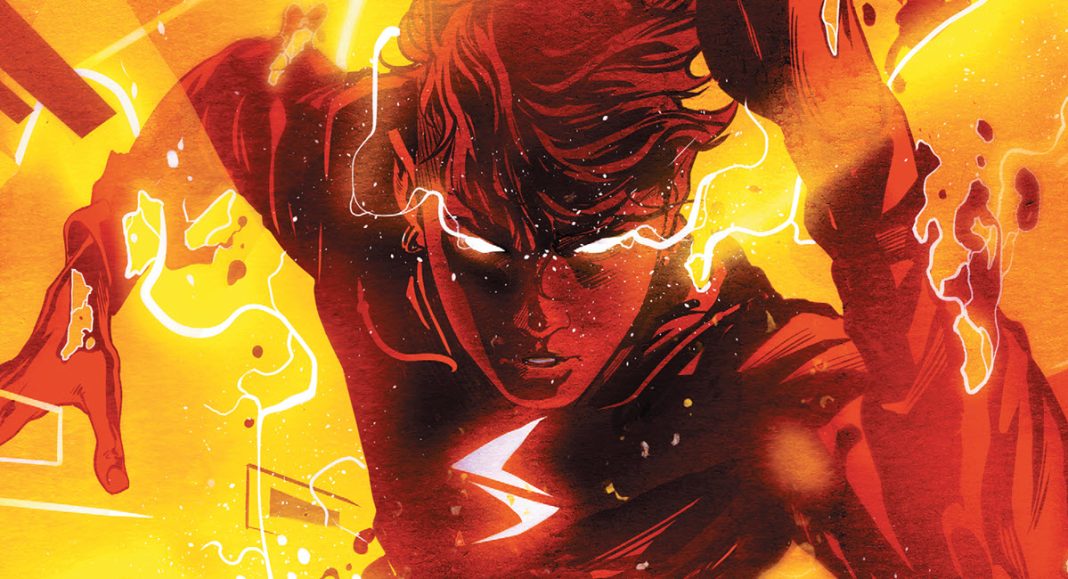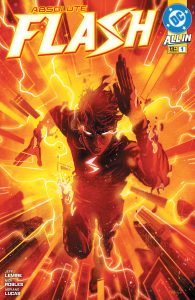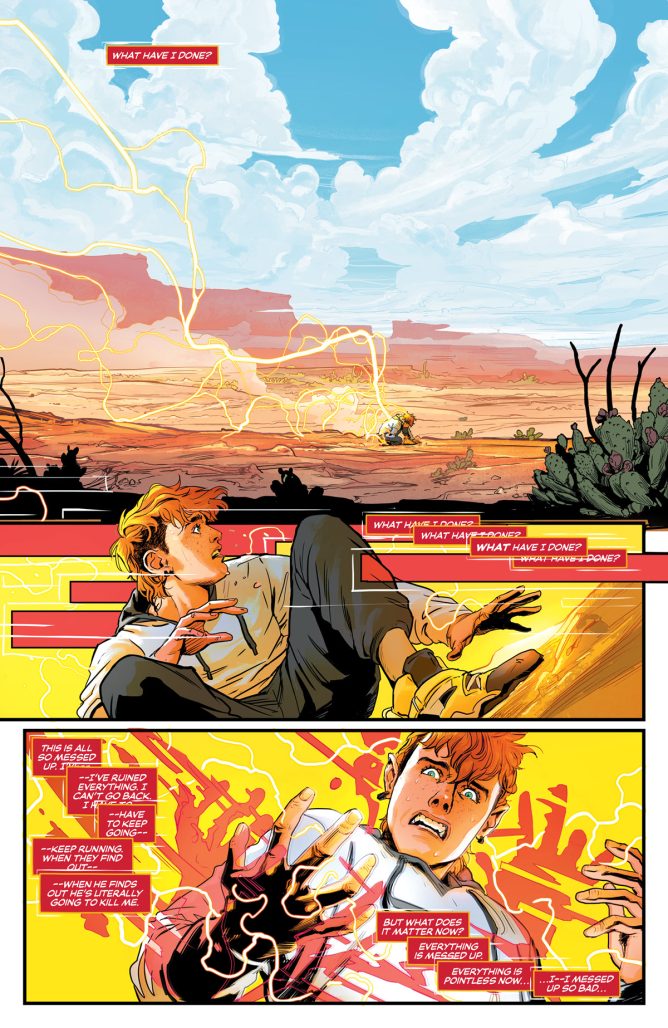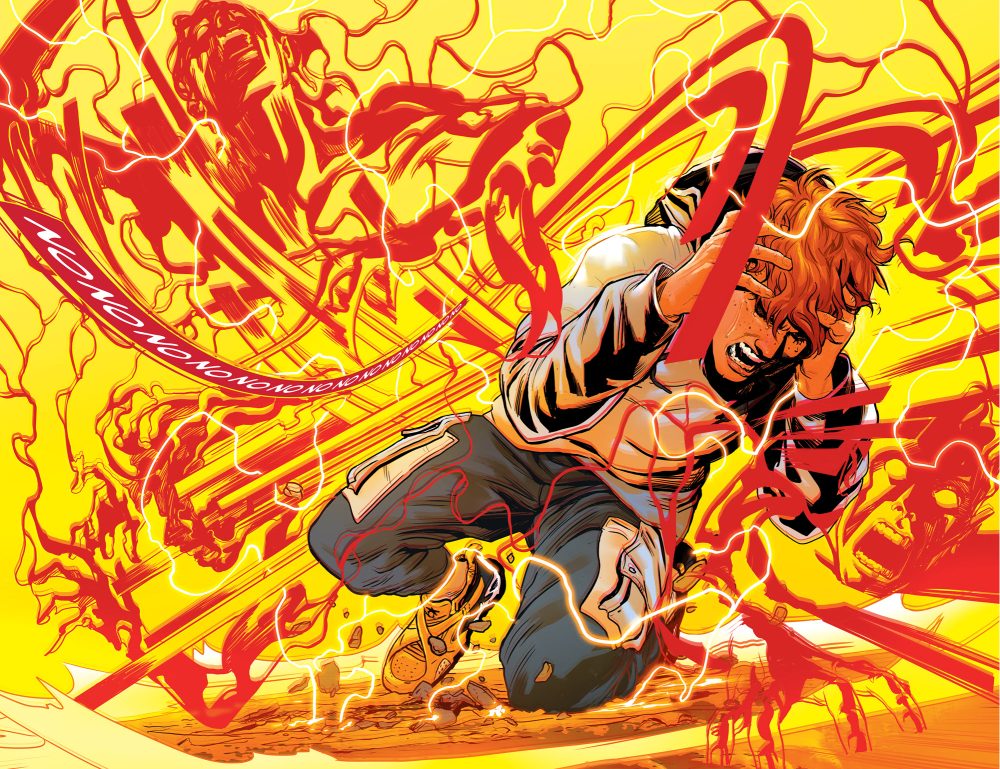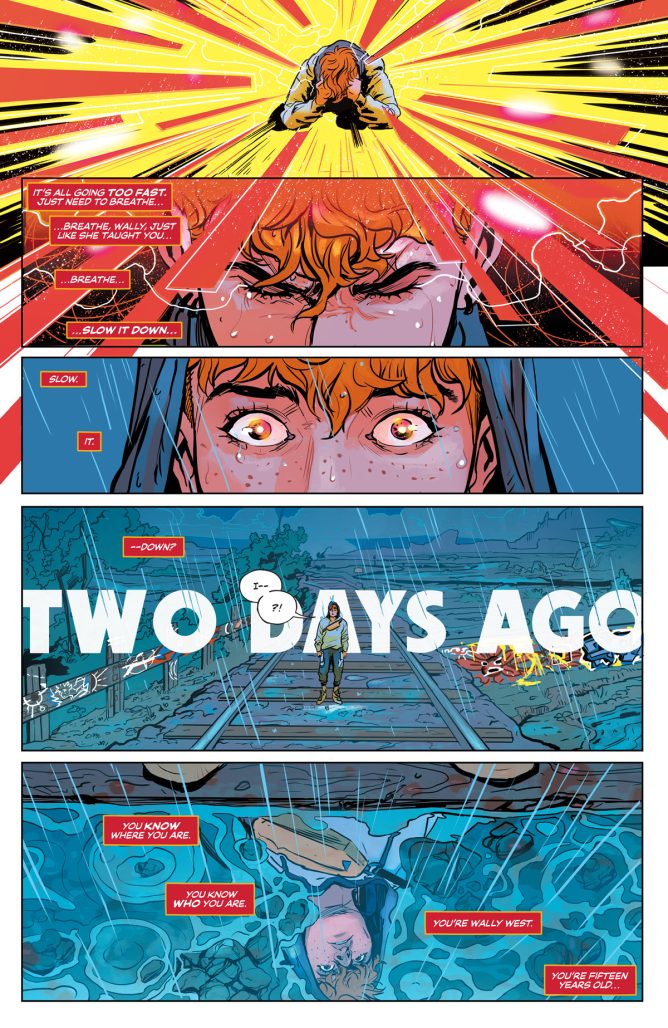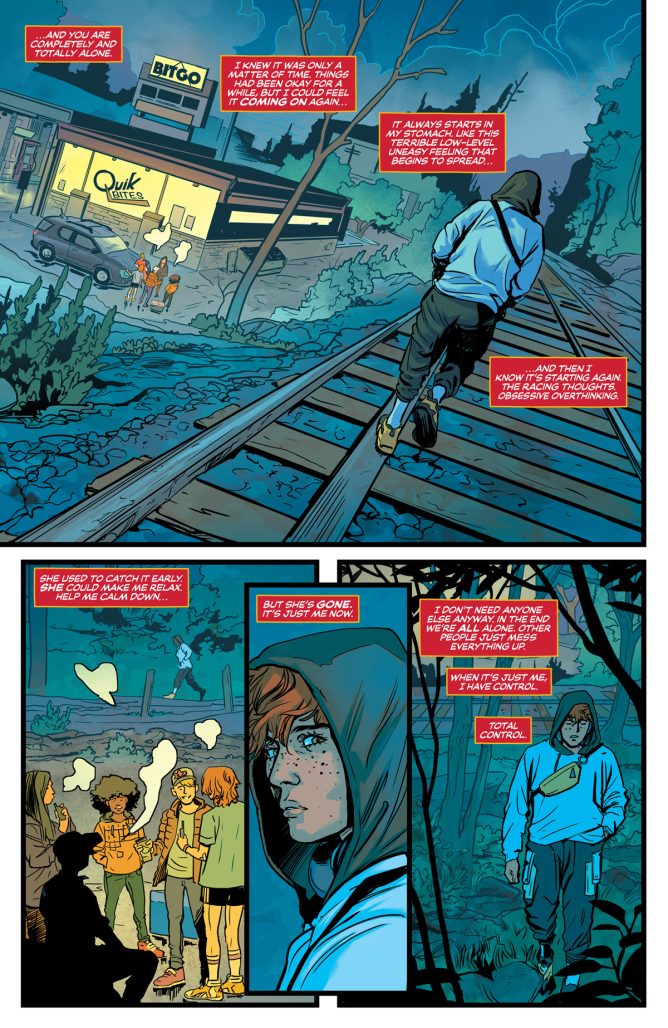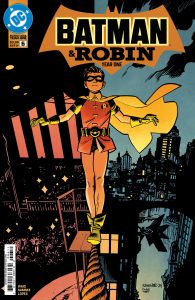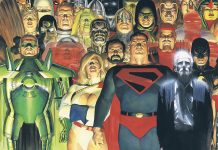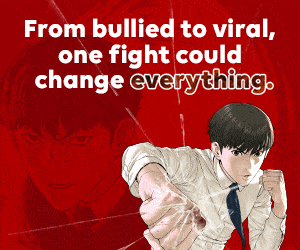THIS WEEK: The Absolute Universe gains a Scarlet Speedster in Absolute Flash #1.
Note: the review below contains spoilers. If you want a quick, spoiler-free buy/pass recommendation on the comics in question, check out the bottom of the article for our final verdict.
Absolute Flash #1
Writer: Jeff Lemire
Artist: Nick Robles
Colorist: Adriano Lucas
Letterer: Tom Napolitano
Cover Artist: Nick Robles
In a lot of ways, Absolute Flash is the first real test of the Absolute concept. Batman, Superman, and Wonder Woman are all relatively straightforward sells, characters either with innate abilities or no powers whatsoever (unless you count being super-rich as a superpower). There are a lot more moving parts to The Flash, though, and not just in terms of how a normal person acquires superspeed. One might have expected Barry Allen or even Jay Garrick to be DC’s Absolute Flash, but the decision to put Wally West into the role felt like a bold move: in a universe without legacy, what happens to the ultimate legacy hero? With this week’s Absolute Flash #1, Jeff Lemire, Nick Robles, Adriano Lucas and Tom Napolitano set out to answer that question, or at least begin to, with a debut issue that raises a lot of mysteries and teases for things to come.
Origin stories can sometimes be kind of a slog, but Lemire, Robles, and co. take a smart approach to Wally’s, jumping around in time between a present day when he already has his abilities and the two days prior. The time-jumping allows the story to include some action in the present day while offering important backstory in the flashbacks. There’s also an implication that the time-jumping might be related to Wally’s abilities and not just a storytelling trick, so it’ll be interesting to see how that plays out.
As for the teenaged Wally himself, at a glance, outside of the mop of red hair, he’s largely unrecognizable compared to his mainline DCU counterpart. An introverted army brat, this Wally struggles with forming relationships, and he particularly can’t connect to his military father, who’s trying to raise him single-handedly after the death of Wally’s mother. Wally finds friendship in Barry Allen, a young scientist on the military base and, in a nice bit of symmetry, the apparent catalyst for Wally’s future superheroing. It’s not unfamiliar storytelling ground, and all of the characters fit familiar archetypes – the rebellious teenager, the overbearing father, the cool outside adult figure – but it works as a springboard for the story to launch off of.
If there’s one trait that Absolute Wally has in common with the original Wally, it’s also one that makes both of them highly relatable: he’s lonely, and he’s looking for his place in the world. For original Wally, it was as the lone member of The Flash Fan Club in Blue Valley, Nebraska; for Absolute Wally, it’s as a kid with anxiety who’s been forced to move around frequently. The trappings are different, but the essence of pre-speed Wally is the same, and one can imagine that his powers will be what ultimately give him his purpose as the series progresses.
Absolute Flash #1 is a characterization-heavy issue, with a lot of dialogue and a lot of emotion, and Robles and Lucas handle it very well. Robles’s characters are emotive, with distinctive physicality. Wally’s father strikes an imposing figure, while Barry’s demeanor is laidback and open. Wally himself is quiet and closed off, hiding under in his hoodie, slouching with his hands shoved in his pockets. Lucas’s colors during the pre-powers scenes are fairly subdued, making the bright red and yellows of Wally’s burgeoning powers in the present-day sequences stand out spectacularly.
Unlike the Absolute titles that have come before it, Absolute Flash doesn’t quite hit the ground running (pun absolutely intended). This first issue lays a lot of groundwork for what’s to come, seeding relationships and mysteries yet to be explored. It’s not the most thrill-packed debut, but it’s certainly intriguing, and this version of Wally is immediately a compelling lead. If the series can push ahead and build out the characters and their relationships further, this has the potential to be the best Absolute title yet.
Final Verdict: BUY.
Round-Up
- It was a really strong week for DC releases, so we’ll hit some of the highlights. Batman & Robin: Year One #6 brings Mark Waid, Chris Samnee, Matheus Lopes, and Clayton Cowles‘s telling of the dynamic duo’s early days to its midpoint with an issue that, like the boy wonder on its cover, sees the team find some kind of balance. It’s action-packed and character-driven and it’s the best issue of the series yet.
- There’s a triple-shot of Waid-written books this week, and the other two books intersect in an unexpected way. Batman/Superman: World’s Finest #37 with Adrián Gutiérrez, Matt Herms, and Steve Wands wraps the current Aquaman-centric arc for the series, while Waid, Bryan Hitch, Kevin Nowlan, David Baron, and Richard Starkings & Tyler Smith‘s Superman: The Last Days of Lex Luthor #2 brings the Black Label series back after nearly two years for an issue that sees Superman continuing his search for a cure for Lex’s mystery disease with a trip to, among other places, Atlantis. The Lori Lemaris fans out there are eating well.
- Back in the mainline DCU and Christopher Cantwell, Sean Izaakse, Amancay Nahuelpan, Romulo Fajardo Jr., and Hassan Otsmane-Elhaou‘s Challengers of the Unknown #4 and Alex Segura, Cian Tormey, Raül Fernandez, Romulo Fajardo Jr., and Willie Schubert‘s The Question: All Along the Watchtower #5 bring another pair of series that have worked in tandem with each other to their penultimate issues. Each of these books has featured strong, character-driven stories that have built on the All In status quo nicely, adding new elements and new mysteries to a world without Darkseid. Hopefully there’s more of both of these where that came from after these books wrap next month.
- And speaking of a Darkseid-less world, Ram V, Evan Cagle, guest-artist Bernard Chang, Francesco Segala, and Tom Napolitano’s The New Gods #4 continues its look at how the remaining denizens of Apokolips and New Genesis are reacting to the power imbalance left by Darkseid’s absence. The team introduces new concepts and characters who would feel right at home in Jack Kirby‘s original series, and there’s an air to the proceedings that feels portentous. Like the Fourth World is about to end and actually mean it this time. Really great stuff.
Miss any of our earlier reviews? Check out our full archive!



